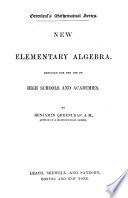 | Benjamin Greenleaf - Algebra - 1879 - 376 pages
...equations, ax = m, a" = n, and dividing, member by member, we have , „ in ax~>> — — n (V »/' 3fiO. The logarithm of any power of a number is equal to the logarithm of the number, multiplied by the exponent of the power. For, assume the equation, a* = m,... | |
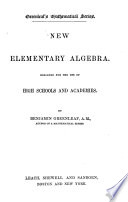 | Benjamin Greenleaf - 1879 - 346 pages
...equations, a* = wi, ai — n, and dividing, member by member, we have in which x — y = loga ( —V 360. The logarithm of any power of a number is equal to the logarithm of the number, multiplied by the exponent of the power. For, assume the equation, of =zm,... | |
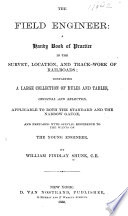 | William Findlay Shunk - Railroad engineering - 1880 - 362 pages
...logarithm of a quotient is equal to the logarithm of the dividend diminished by that of the divisor. The logarithm of any power of a number is equal to the logarithm of the number multiplied by the exponent of the power. The logarithm of any root of a number... | |
 | James Hamblin Smith - 1883 - 466 pages
...1-7191323 their difference = -8508148 which is the logarithm of 7-092752, the quotient required. 457. The logarithm of any power of a number is equal to the product of the logarithm of the numbcr and the index denoting the power. Let m=a'. Then m'=o"; .'. log.m' = rx = r. log.m. Thus the... | |
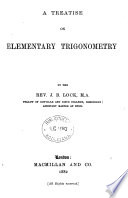 | John Bascombe Lock - 1882 - 378 pages
...is equal to the difference of the logarithms of the dividend and divisor. (iii) The logarithm of the power of a number is equal to the product of the logarithm of the number by the index denoting the power. (iv) The logarithm of the root of a number is equal to the result of dividing... | |
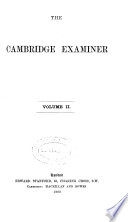 | Education, Higher - 1882 - 498 pages
...all together. 16. Define a logarithm. Prove that the logarithm of any power, integral or fractional, of a number is equal to the product of the logarithm of the number and the index of the power. Find log 450, having given log 2 = -30103, log 3 = -477121. 17. A man has... | |
 | Henry Nathan Wheeler - Logarithms - 1882 - 60 pages
...0.1761. m Given: Iogw123 = 2.0899 ; what is Iog100.123?_ Ans. 2.0899-3 = 1.0899. § 8. In any system the logarithm of any power of a number is equal to the logarithm of the number multiplied by the exponent of the power. Proof: If I = 6х, then is log6Z =... | |
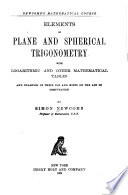 | Simon Newcomb - Trigonometry - 1882 - 372 pages
...of a quotient is found by subtracting the logarithm of the divisor from that of the dividend. III. The logarithm of any power of a number is equal to the logarithm of the number multiplied by the exponent of the power. IV. The logarithm of the root of a... | |
 | George Albert Wentworth - Trigonometry - 1882 - 232 pages
...— = a — b = log A — log B. J3 4. The logarithm of a power of a number is found by multiplying the logarithm of the number by the exponent of the power. For, A" = (10a)" = 10e". Therefore, log A* = an = n log a. 5. The logarithm of the root of a number is found... | |
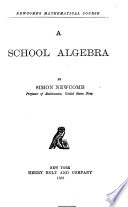 | Simon Newcomb - Algebra - 1882 - 302 pages
...— = 10*-*= -. Hence, by definition, A — k = los—, 9 or log p — log q = log—. THEOREM IX. The logarithm of any power of a number is equal to the logarithm of the number multiplied by the exponent of the power. • Proof. Let h = log p, and let... | |
| |